How to Get Medical Care in France as a US Visitor

Getting medical care in France as a US visitor requires preparation and knowing the right steps. Always carry travel insurance documentation and keep digital copies of your medical records and prescriptions. For emergencies, dial 15 to reach SAMU (medical emergency services) or 112 for general emergencies – both have English-speaking operators. Download healthcare apps like Doctolib to find doctors and book appointments. Regular doctor visits cost €23-70, while hospital stays run about €20 per day in public facilities. Local pharmacists can offer advice for minor ailments and fill prescriptions. Understanding these basics will make navigating French healthcare much smoother.
Call Emergency Number 15
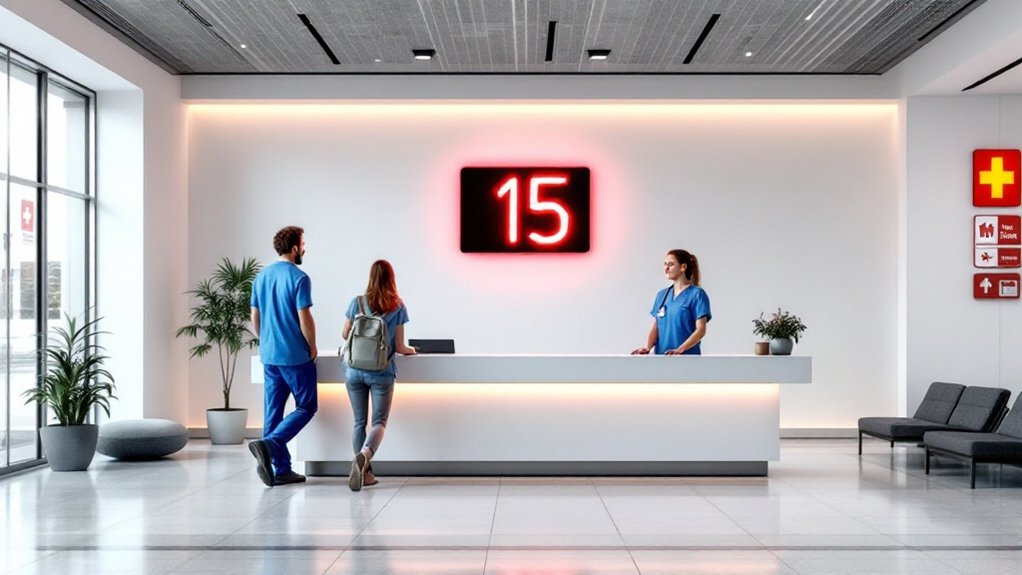
In France, dialing 15 connects you directly to SAMU (Service d’Aide Médicale Urgente), the emergency medical response service that operates 24/7 for life-threatening situations. When you call 15, be prepared to clearly state your name, location, phone number, and describe the medical emergency – whether it’s severe chest pain, difficulty breathing, or a serious accident. This free emergency service dispatches medical teams quickly to your location and can coordinate with other emergency responders if needed, so don’t hesitate to call if you’re experiencing a genuine medical crisis! English-speaking operators are available through SAMU’s 100 call centers nationwide, ensuring communication assistance for international visitors.
When To Call 15
Understanding when to call France’s emergency medical number 15 could mean the difference between life and death. As part of your emergency tips and response training before traveling, remember that this number is reserved for serious medical situations requiring immediate attention.
You should dial 15 when faced with life-threatening conditions like cardiac arrests, severe injuries from accidents, or serious allergic reactions. The service provides round-the-clock support and can dispatch ambulances or doctors directly to your location. SAMU’s experienced staff will provide medical advice over the phone while help is on the way. When calling, stay calm and provide clear details about your situation and exact location.
For less urgent medical needs, consider alternative options like visiting a local hospital’s A&E department or calling 116 117 for an out-of-hours doctor. Remember, you can also dial 112 for emergency assistance anywhere in Europe.
Medical Emergency Phone Basics
When faced with a medical emergency in France, knowing how to efficiently communicate with emergency services can save precious time and lives. Simply dial 15 to connect directly with SAMU, France’s professional emergency response team.
When calling, be ready to clearly state your name, phone number, and exact location. The call center is staffed by French doctors who will assess your situation and determine the appropriate response. Don’t worry if your French isn’t perfect – many operators understand basic English. Keep in mind that you’ll need to share any relevant medical terminology, including current medications and health conditions.
Stay on the line until the operator tells you to hang up, and have any building access codes ready. Remember, you can also dial 112 if you can’t connect to 15. For less urgent health concerns, consider using online consultation services that are available 24/7 for basic medical advice.
Free Emergency Response Service
France’s comprehensive emergency response service operates through a simple three-digit number – 15 – connecting callers directly to SAMU (Service d’Aide Médicale Urgente).
When you call 15, trained medical professionals at one of 100 hospital-based call centers will assess your situation and determine the appropriate response. They might dispatch an ambulance, send an emergency response team, or direct you to local health care options. Due to increased demand, these centers now handle 600 to 1,000 calls daily. For your convenience, you can also reach emergency services by dialing 112, the European Union’s universal emergency number.
While the system faces some staffing challenges, it provides reliable 24/7 access to medical care. For non-emergencies, consider visiting a pharmacy (look for the green neon cross) or using online consultation services, which typically cost between €15 and €30.
Carry Valid Travel Insurance Documentation
Securing proper travel insurance documentation is vital for accessing medical care in France, particularly for international visitors. When seeking treatment, having your insurance policy and coverage limits readily available guarantees smooth interaction with healthcare providers and expedited care. With providers like Allianz Travel offering medical coverage up to €200,000, comprehensive protection for healthcare needs abroad is available.
- Keep digital and physical copies of your insurance card showing policy numbers and coverage details
- Store emergency contact information for your insurance provider’s 24/7 assistance line
- Save documentation showing proof of minimum €30,000 coverage if required for your visa status
While US citizens aren’t required to carry travel insurance for France, having proper coverage offers peace of mind and financial protection. Major providers like AXA and Seven Corners offer comprehensive plans tailored for US visitors, with coverage ranging from €100,000 to €200,000 for medical expenses and repatriation services.
Finding Local Doctor Directories

Finding a qualified doctor in France begins with accessing reliable directory services. The most comprehensive resource is the Ameli directory (annuairesante.ameli.fr), where you can search by location and specialty while reading doctor reviews. For English-speaking visitors, platforms like Doctolib and Maiia offer convenient appointment tips and language filters.
| Directory | Key Features | Best For |
|---|---|---|
| Ameli | Official database, fee filters | Local doctors |
| Doctolib | Online booking, reviews | Quick appointments |
| U.S. Embassy | English-speaking doctors | American visitors |
| SOS Médecins | 24/7 house calls | Urgent care |
| Maiia | Language filters, specialists | Language preferences |
Remember that many French doctors require upfront payment, so keep your travel insurance documentation handy. For urgent needs, pharmacies can handle minor concerns, while SOS Médecins provides house calls for €50-70.
Know French Medical Terms
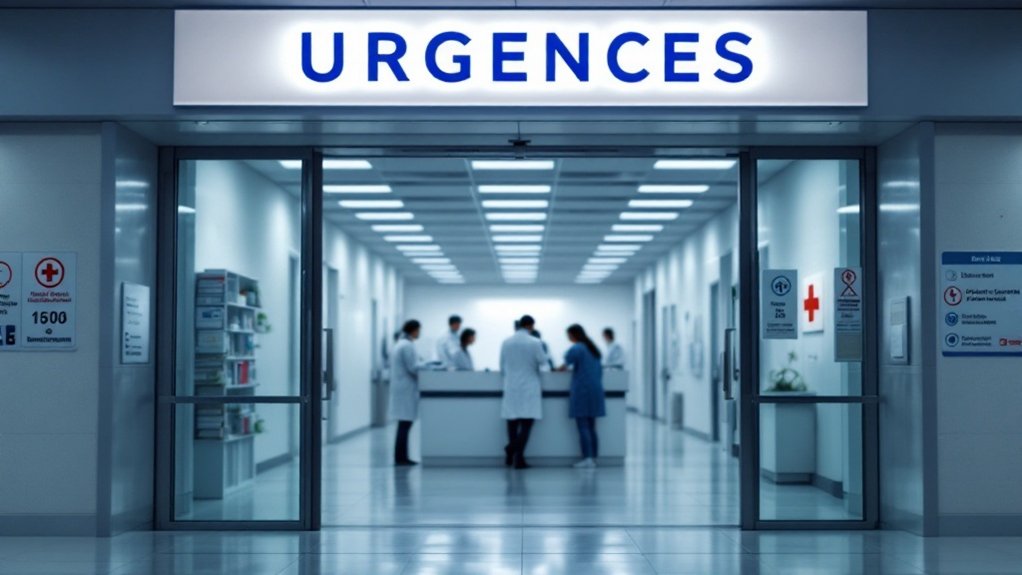
Understanding basic French medical terminology will help you communicate efficiently with healthcare providers during your visit to France. Being familiar with common terms for body parts, symptoms, and medical conditions allows you to describe your health concerns accurately and understand diagnoses. While many French medical professionals speak some English, knowing key medical phrases in French will make your healthcare experience smoother and reduce the chance of miscommunication!
- Learn crucial body part vocabulary first, as these terms form the foundation for describing symptoms and locations of pain or discomfort
- Practice pronouncing medical terms before you need them – especially challenging words like “ordonnance” (prescription) and “médicament” (medication)
- Keep a digital note on your phone with key medical vocabulary and common phrases translated into French for quick reference during appointments
What You Need to Know
A basic grasp of French medical terminology is vital for accessing healthcare services in France. Whether you’re engaging in medical tourism or simply need emergency care while visiting, knowing key medical terms can help you maneuver through the French healthcare system with confidence. Understanding healthcare etiquette and being able to communicate your symptoms efficiently will guarantee you receive appropriate care.
- Learn indispensable emergency terms like “urgences” (emergency department) and “SAMU” (emergency medical service) – these could be pivotal in urgent situations
- Familiarize yourself with common ailment descriptions such as “mal à la tête” (headache) and “fièvre” (fever) to accurately describe your symptoms
- Know the different medical specialists: “dentiste” (dentist), “dermatologue” (dermatologist), and “pédiatre” (pediatrician) for specialized care needs
Common Mistakes to Avoid
While maneuvering through the French healthcare system can be complex, patients commonly make avoidable mistakes due to misunderstanding medical terminology and procedures. Learning vital Medical Vocabulary and understanding how French Pharmacies operate can save you time, money, and frustration. Remember that pharmacists in France are highly trained and can offer valuable medical advice for common ailments.
- Not knowing key terms like “médecin traitant” (primary care physician) and “parcours de soins” (care pathway) can lead to higher costs
- Failing to understand the difference between “secteur 1” and “secteur 2” rates when choosing doctors
- Overlooking the fact that French Pharmacies can provide basic medical consultations and treatment recommendations
Understanding these aspects will help you traverse the system more efficiently and guarantee you receive proper care while maintaining your independence in managing your health needs.
Pro Tips
Knowledge of French medical terminology serves as a vital bridge between patients and healthcare providers in France. Understanding key medical terms and phrases can make a significant difference in emergency preparedness and efficient communication with French doctors. Being able to accurately describe your symptoms and understand medical instructions in French empowers you to take control of your healthcare experience abroad.
- Keep a digital note or printed card with important French medical terminology, including common conditions and emergency phrases
- Learn the correct pronunciation of significant medical terms – especially those related to any pre-existing conditions you have
- Practice constructing basic sentences about symptoms and pain using “J’ai mal à…” (I have pain in…) and “Je suis…” (I am…)
Bring Medical History Records
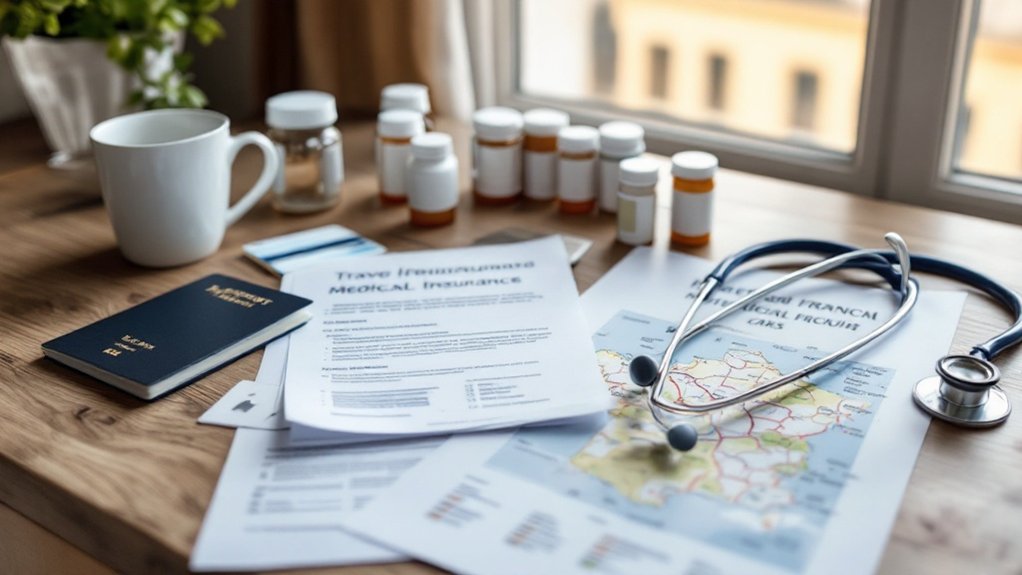
Planning ahead for medical care in France involves understanding both the timing of your preparations and potential costs, which can range from €23-70 for a basic doctor’s visit. You’ll want to gather and organize your medical records at least two weeks before departure, making copies and translations of crucial documents while verifying your insurance coverage limits. To make the process smoother, consider downloading the French health ministry’s official TousAntiCovid app and bookmarking helpful resources like the U.S. Embassy’s healthcare provider list!
Costs and Budget
Securing medical care in France requires a clear understanding of the costs and coverage options available to international patients. When budget planning, remember that you’ll need to pay full costs upfront if you’re not covered by French social security. While healthcare costs in France are generally lower than in the US, it’s crucial to have comprehensive private insurance coverage.
| Procedure | Standard Cost | ELSAN Facilities |
|---|---|---|
| Cataract Surgery | €3,000 | €2,600 |
| Coronary Angioplasty | €9,000 | €8,700 |
| Knee Replacement | €14,000 | €14,000 |
For cost comparison, consider that while public hospitals charge a daily fee of €20, private clinics may add comfort and service fees. Remember to factor in extra expenses like medications, which are only available through pharmacies, and potential private room charges when planning your medical budget.
Timing and Planning
Successfully managing your healthcare needs in France begins with thorough preparation of your medical documentation before departure. Efficient timing strategies involve gathering and organizing your medical records at least one month before travel, while planning ahead for potential healthcare needs during your stay.
- Compile a comprehensive medical history folder including recent test results, prescriptions, and vaccination records translated into French
- Create digital copies of all medical documents stored securely on your phone and in cloud storage
- Set calendar reminders to refill prescriptions before departure, ensuring a sufficient supply for your entire stay
Remember to contact your insurance provider early to verify coverage and obtain necessary pre-authorizations. Getting your documentation in order now means less stress and better care if you need medical attention while in France.
Additional Resources
Medical records serve as your healthcare passport when seeking treatment in France. Having comprehensive documentation guarantees you’ll receive appropriate care and avoid unnecessary complications. Make certain to organize your healthcare resources before departure and keep them easily accessible during your stay.
- Bring original documents plus copies of your complete medical history, including vaccination records, prescriptions, and any chronic conditions
- Keep digital copies of all medical documentation stored securely on your phone or device
- Maintain a list of emergency contacts, including your home doctor and medical support networks
Remember that French healthcare providers may require payment before non-emergency treatment. Having your records readily available helps streamline the process and guarantees you receive appropriate care that aligns with your medical history and needs.
Pack Flu Meds in Winter
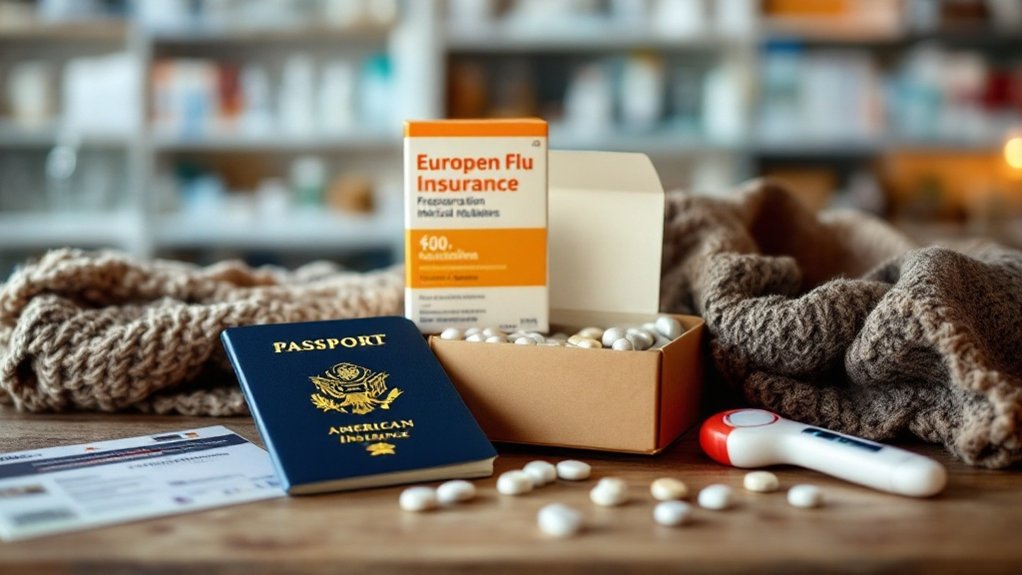
When preparing for a winter trip to France, it’s vital to pack necessary flu medications along with your regular prescriptions to handle any potential illness abroad. Make sure to bring basic cold and flu remedies like decongestants, pain relievers, and throat lozenges, as finding exact equivalents of American brands can be challenging in French pharmacies. Consider the local winter weather conditions and pack accordingly – France’s damp winters can increase the likelihood of catching a cold, so having familiar medications on hand will help you stay comfortable and enjoy your trip.
Bring Basic Cold Medicine
Planning ahead with cold medications requires careful consideration when traveling to France due to significant restrictions on common over-the-counter remedies. As of December 2024, France has banned eight popular cold medicines containing pseudoephedrine due to cardiovascular health risks, making them available by prescription only.
When packing for your trip, focus on safe alternative remedies for managing cold symptoms. While nasal sprays with vasoconstrictors remain available, oral decongestants containing pseudoephedrine are no longer recommended. The French National Agency for the Safety of Medicines advises consulting a doctor before taking any cold medications. Be proactive by researching permitted medications and bringing only approved remedies. If you encounter symptoms while in France, local pharmacies and medical facilities can guide you toward safe treatment options.
Pack Personal Prescriptions First
Every traveler requiring prescription medication must prioritize proper documentation and packing when preparing for a trip to France. Start your prescription organization early by gathering original containers and obtaining a detailed letter from your doctor listing all medications.
Before departure, verify that your prescriptions are legal in France – some U.S. medications aren’t permitted overseas. Pack enough medication for your entire stay plus extra in case of delays. Create a comprehensive list of your medications, including dosages and your doctor’s contact information, and consider having it translated into French. For worry-free medication travel, keep prescriptions in your carry-on bag and bring copies of all documentation. Remember to check if your medications contain restricted ingredients like pseudoephedrine, which faces tight regulations in France.
Consider Local Weather Conditions
France’s diverse winter climate demands strategic preparation for medical needs across its regions. With temperature expectations varying significantly from Nice’s mild 15°C to Paris’s near-freezing nights, smart packing of both winter clothing and medications is crucial. Consider bringing common cold remedies, as local options like Exomuc and Smecta might differ from what you’re used to.
While southern cities like Marseille stay relatively warm, northern areas can experience sudden cold snaps and snowfall. If you’re visiting Paris or Strasbourg in December, pack extra cold medicines alongside your thermal layers. Be aware that some French cold medications containing pseudoephedrine carry health warnings, but nasal sprays offer a safer option. For budget-conscious travelers, generic versions of cold medicines are readily available at French pharmacies at lower prices.
Download French Hospital Apps
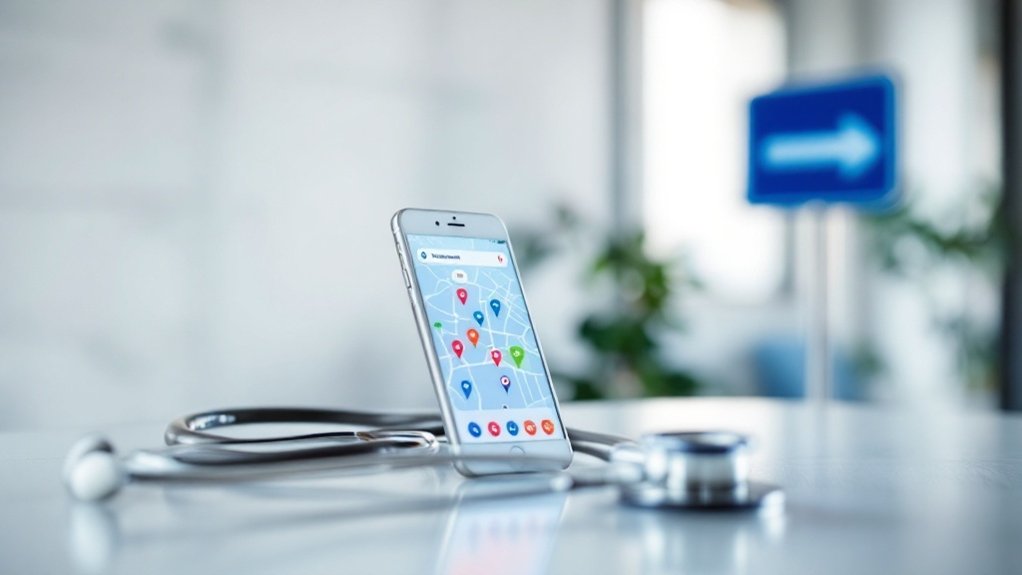
When seeking medical care in France, downloading specialized healthcare apps can significantly streamline your access to medical services. Leading platforms like Doctolib and Maiia offer comprehensive features, from virtual consultations to appointment booking. User reviews help you choose trusted healthcare providers, while app features like electronic prescriptions and multilingual support make managing your medical needs hassle-free.
- Book virtual or in-person consultations with licensed French physicians 24/7
- Access electronic prescriptions and manage medical records digitally
- Find detailed information about healthcare facilities with maps and directions
These apps serve as your personal healthcare assistant in France, offering freedom to access medical care on your terms. With options for teleconsultations and medication management, you’ll have peace of mind knowing quality healthcare is just a tap away.
FAQ
Can I Use My U.S. Health Insurance Card in French Pharmacies?
Like a key in the wrong lock, U.S. health insurance cards won’t work directly in French pharmacies due to insurance limitations and local pharmacy policies. You’ll need to pay upfront and seek reimbursement later.
How Much Does a Typical Doctor’s Visit Cost in France?
A standard doctor consultation in France costs €25 for a general practitioner and €31 for specialists, with healthcare costs remaining notably affordable compared to many other advanced nations.
Are English-Speaking Doctors Common in Smaller French Towns?
Like scattered wildflowers in a vast meadow, English-speaking doctors are rare in smaller French towns. Cultural differences and language barriers make finding them challenging, though some younger physicians offer bilingual services.
Do French Hospitals Accept Credit Card Payments From Foreign Visitors?
French hospitals typically avoid credit card payments due to transaction fees. They prefer direct bank transfers for hospital payment, though policies may vary between institutions, especially for foreign visitors.
What Vaccines Are Required for U.S. Travelers Entering France?
While a million rules exist, France’s entry requirements primarily focus on COVID-19 vaccination. Other vaccine recommendations include Hepatitis A/B, MMR, polio booster, and routine immunizations for optimal travel freedom.






